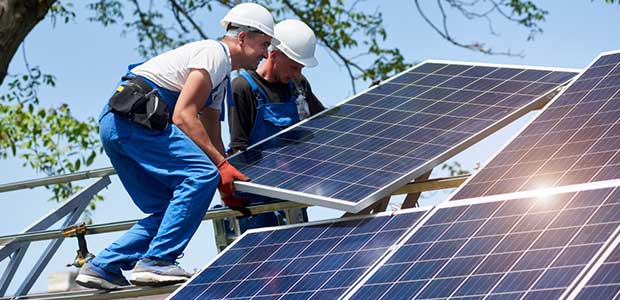
Will Businesses Become Greener After COVID?
As the pandemic continues, the need for environmentalism shows the overlap between health, sustainability and business. It is up to businesses to adapt, and improve.
- By Jenna Tsui
- Jul 24, 2020
The coronavirus pandemic has affected every aspect of daily life, whether it is public health, the environment or the economy. Sustainability has always been a hot topic, but now, business professionals see it as a path forward after COVID-19 passes. As the pandemic continues, the need for environmentalism shows the overlap between health, sustainability and business.
Global Necessities
COVID-19 is a virus that primarily affects the lungs. Similarly, low air quality does the same. Pollution is not new, but the pandemic is exposing how tragic and widespread its effects can be. A Harvard study recently connected higher COVID mortality rates with lower air quality.
This study shows the link between everyday life, industry work and health. Emissions from company buildings like factories are hurting the general public while polluting the environment. Before the pandemic hit, pollution still caused issues like premature death or asthma. However, the coronavirus shows how dire this dynamic is—businesses need to focus on green strategies.
In 2018, industry emissions accounted for 22 percent of the United States' total emissions production. Factories and energy-wasting buildings are big components of this percentage. If they use fossil fuels without actively saving energy, air quality decreases.
It is not all bad news, though. The pandemic shows how there is potential for quick, meaningful change. As stay-at-home orders and lockdowns swept the world, pollution levels dropped in major cities within a few weeks. People had to remain at home without going to work or driving anywhere, if possible. Therefore, emissions plummeted.
This decrease highlights the possibilities ahead. Cities and businesses are returning to previous pollution levels as the world “reopens,” but businesses have no seen that they have the tangible power to take more sustainable, renewable routes quickly.
Job Creation
One of the main, misguided arguments against renewable energy is the cost. People point to the prices as a detrimental aspect and claim that businesses should instead stick with fossil fuels. However, recent technology, industry developments and calls for clean energy prove that green energy is, more often than not, just as affordable if not less expensive than many fossil fuel options.
Check out this article about some of the most common myths about the green energy sector.
With some researchers warning about the point of no return, climate change is more pressing than ever. The pandemic shows how sustainable change is possible, though. The drops in air pollution in major cities happened quickly—a transformation like that on a global scale with more efficient energy options (and with intention) could help public health and the environment. Global economies would benefit, too.
Economic recovery during and after COVID-19 should have a large focus on sustainable and renewable power. Businesses will thrive from the number of green energy jobs this path creates, which will ultimately stimulate the economy.
Businesses would see many benefits. Renewable energy is becoming increasingly cheaper to implement. With this type of power, companies could improve their impact on the environment and public health with green practices. They could do so all while meeting consumers' needs and demands.
Consumer Behavior Changes
COVID-19 is not selective—it affects anyone and everyone. Due to such widespread vulnerability, people want to know which businesses are looking out for them. What has your company done to help? Have you taken creative steps to extend business operations and ensure social distancing?
Creative and efficient workplace practices are a step in the right direction. Services like curbside pickup or delivery with safety precautions provide customer service in safe ways and show employees and customers that you care. Many delivery apps like DoorDash and Grubhub are taking these strides.
In a survey from Porter Novelli, 75 percent of American respondents said they will remember which companies stepped up and helped the most during the pandemic. These answers, of course, will vary. With the overlap of public health and environmental impacts, though, it is safe to say that many consumers will focus on how businesses combine the two areas.
Already, consumer behaviors are changing. People are getting more locally sourced food, focusing on safety precautions and public health, trying to waste fewer resources and turning toward better energy practices.
Consumers will want to buy from businesses that do the same. For instance, businesses can adapt digital tools for waste reduction, or improve their green building practices for energy efficiency. As consumer behaviors and demands continue to change, businesses will follow.
TOMS is a common example of a company that is following the green calls-to-action from consumers. Both while the pandemic continues to spike and after it eventually passes, TOMS shows a way forward. Meeting these health and environmental demands, in turn, highlights a dedication to the overlap between the economy, the Earth and the public.
A Green Business Thumb
As there is no current cure, vaccine or herd immunity, the pandemic is here to stay. In its wake, it exposes how environmental initiatives, public health and economic recoveries all tie together. One affects the others with every fluctuation. Comprehensive green changes are the way forward for businesses during and after COVID-19.
About the Author
Jenna Tsui is a Texan journalist who co-owns The Byte Beat blog. She writes about the latest news in sustainability, culture, technology and more. Check out her work on TBB or follow her on Twitter @jenna_tsui .